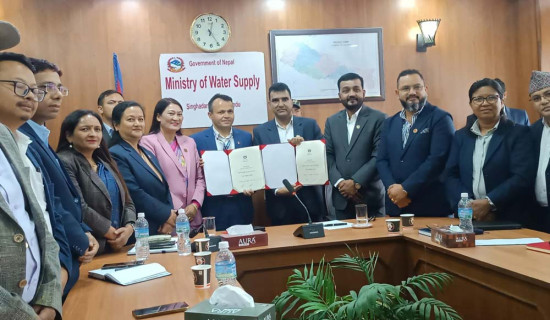- Friday, 9 May 2025
Woes Of Workers
Nepalis started going abroad (other than India) as migrant workers in the early 1990s. Limited job prospect, unemployment, slow economic growth, and political instability at home have been the major factors sending hundreds of thousands of our youths overseas for work in the hope of building a future out of the crippling poverty. Remittances they send account for over a quarter of the economy. During the past decade, nearly five million job aspirants have received labour permit. And sadly, over 12,000 have perished in the past one-and-a-half decade due to deteriorating health conditions and accidents in line of duty, or even suicide.
Most of the male Nepali migrant workers are employed in low-skilled sectors, such as construction and manufacturing, whereas their female counterparts work as caregivers or housemaids. While the money they send in is desperately needed not only for their families to make ends meet but also to run the economy, their working conditions or rights they enjoy are far from satisfactory. Many lack health benefits, timely paychecks, formal contracts, and cannot leave old company for a new one as they wish, among other problems.
This daily the other day ran a story elaborating a wide range of hardships Nepali migrant workers endure in India or third world countries, especially the Gulf. With millions of our countrymen toiling abroad and their plights making frequent headlines in both national and international headlines, it warrants that we discuss their long-standing issues and help them find ways out. Though things have significantly improved since 2015, when the BBC and other international media ran story after story highlighting the premature deaths of young Nepali migrant workers in the Gulf.
The sudden and inexplicable deaths of young men, who were determined fit before their departure to work in desert conditions and had gone there taking loans amounting to millions, left many wonder whether such employment was worth it. Making matters worse, many of such deaths were not covered by insurance and the family back home, lacking means to pay back the loan, had to contend with the piling interests. Many also return home mutilated or severely injured, requiring in some cases lifetime of treatment. How will a family bear such an insurmountable burden when its sole breadwinner has to be taken care of?
What's more, many were denied returning home to aid the families in distress, tend to their injured kin, or conduct the last rites when 2015 earthquakes razed their villages to the ground and killed or injured their loved ones. That was because of the now-abolished notorious system of sponsorship-based employment that gave unchecked power to their employer. The lingering effect of such a cruel system is still there, many say.
There's one more problem: disparity in wages. In some countries, Nepalis still have to content with lower pay for the same work compared with their peers from countries with better international standing. Because of their leverage, these countries have inked labour agreement with the labour destination countries. We can address this problem to some extent by increasing our leverage through prudent diplomacy and inking labour agreements. Recent visit to the country by the Qatar Amir has raised some hopes, though. The best solution, however, is to create enough decent jobs within the country so that there won't be a compulsion to leave home for good paying jobs abroad. In this regard, Prime Minister Pushpa Kamal Dahal Prachanda has pledged that the government will work toward raising the minimum wage of workers in the spirit of international labour right pacts that Nepal has signed.

















